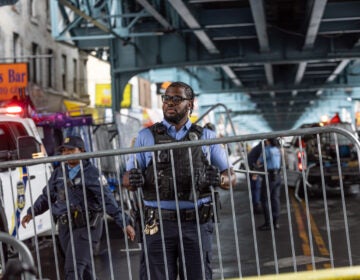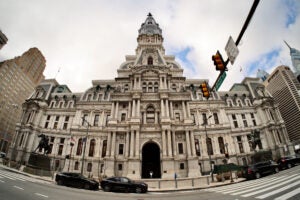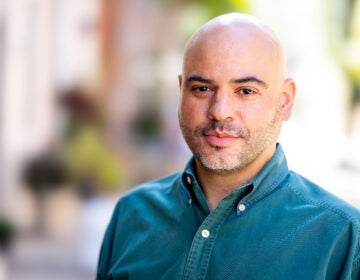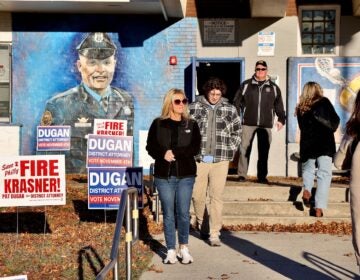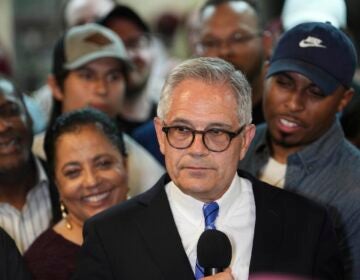After a heated public hearing, Philly City Council moves forward to restrict street outreach providers in Kensington
Proposed legislation would restrict mobile providers from operating on residential streets, near schools and recreation centers and in other public areas of Kensington.
Listen 1:24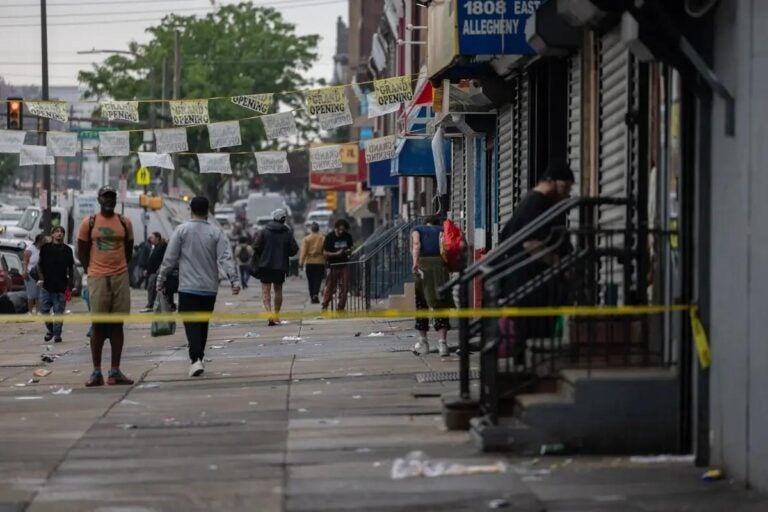
Kensington residents said people in the encampments on Kensington Avenue had spread out to the neighborhood’s side streets after officials swept the area on May 8, 2024. (Kimberly Paynter/WHYY)
From Philly and the Pa. suburbs to South Jersey and Delaware, what would you like WHYY News to cover? Let us know!
Philadelphia City Council members and community service organizations clashed during a contentious public hearing on the future of mobile addiction and recovery services in Kensington on Monday.
Tension and frustration were evident as the city’s Committee on Licenses and Inspections considered and ultimately passed a bill that would restrict where mobile providers who offer food, medical care and harm reduction support from cars and vans can operate within the neighborhood.
Supporters of the bill, including councilmembers Quetcy Lozada and Jim Harrity, said the goal isn’t to ban mobile providers from Kensington, but to increase oversight of services and reduce disruptions to nearby residents and homeowners.
“[Mobile providers] presence often results in excessive litter, large unmanageable crowds, and disruption to everyday life,” Lozada said. “This isn’t about denying critical services to those who need them. It’s about making sure that these services are provided in a responsible, sustainable, coordinated manner that consider the needs of everyone involved.”
Under the proposed legislation, organizations that provide services on the street to people who are homeless, using drugs or living with other physical and mental health complications, cannot operate on residential streets or near schools and recreation centers.
Vans and vehicles will also need to park at least 100 feet away from each other if they offer the same services, like wound care or testing for HIV and sexually transmitted infections.
Critics argued that these restrictions disqualify most areas of Kensington. Reverend Phillip Geliebter, archdeacon of the Episcopal Diocese of Pennsylvania and community volunteer in Kensington, said the bill would not address the root causes of the crisis.
“If you prevent those services from being there, folks are still going to be in that neighborhood. They are just not going to have access to that care and resources,” he said.
Things got heated when Harrity interjected out of order and told Geliebter, “Don’t disrespect my neighborhood,” and when Lozada accused Geliebter of using scripture to elevate the work of mobile providers over the concerns of local residents.
Harrity later repeatedly asked leaders at Project Home, a city housing nonprofit, to provide the number of people it had taken off the streets of Kensington and into housing following their testimony.
Nurse practitioner and wound care specialist Kara Cohen, who oversees the street medicine program at Project Home, said her team currently cares for about 100 people living in and around Kensington.
“If we were not to be present, my patients will still have gaping wounds, but those wounds will be uncovered and more infectious. They will still have diseases, but those diseases will not be treated and can spread,” Cohen said. “There will still be addiction, but there will be lack of connection to MOUD and a lack of connection to recovery.”
Volunteers, medical students and workers from other organizations and health systems that operate mobile services in Kensington also testified that the bill would impact their outreach and ability to connect people to long-term treatment and housing.
But Kensington resident Roberto Rodriguez described the “devastating” effects of concentrated mobile services to the local community and the “unsanitary conditions” they sometimes created, including waste and litter that attract rats and other rodents.
“We see a lot of people on the street, we see a lot of drug dealers and we see a lot of community fighting,” Rodriguez said. “[The bill] represents an important step toward reclaiming Kensington as a place where families and small businesses can thrive.”
Councilmember Harrity, who has lived in Kensington for decades, expressed anger and frustration over the neighborhood’s conditions in recent years. He said the situation has exposed residents, children and families to constant trauma and suffering and forced them to deal with safety risks that follow mobile providers and street services.
“You cannot just allow these people to pull up nilly nilly on a corner, leave all their trash, disrupt their neighbors, disrupt the community, because they think they’re doing good,” Harrity said. “And in reality, they are doing somebody good. That’s the truth of the thing and therein lies the problem. We know that it needs to be done, but we also know that it doesn’t need to be done the way it’s been done.”
Now that the bill passed out of the Committee on Licenses and Inspections, it moves onto the full City Council for consideration.
 This story is a part of Every Voice, Every Vote, a collaborative project managed by The Lenfest Institute for Journalism. The William Penn Foundation provides lead support for Every Voice, Every Vote in 2024 and 2025 with additional funding from The Lenfest Institute for Journalism, Comcast NBC Universal, The John S. and James L. Knight Foundation, Henry L. Kimelman Family Foundation, Judy and Peter Leone, Arctos Foundation, Wyncote Foundation, 25th Century Foundation, and Dolfinger-McMahon Foundation.
This story is a part of Every Voice, Every Vote, a collaborative project managed by The Lenfest Institute for Journalism. The William Penn Foundation provides lead support for Every Voice, Every Vote in 2024 and 2025 with additional funding from The Lenfest Institute for Journalism, Comcast NBC Universal, The John S. and James L. Knight Foundation, Henry L. Kimelman Family Foundation, Judy and Peter Leone, Arctos Foundation, Wyncote Foundation, 25th Century Foundation, and Dolfinger-McMahon Foundation.
To learn more about the project and view a full list of supporters, visit www.everyvoice-everyvote.org. Editorial content is created independently of the project’s donors.

Get daily updates from WHYY News!
WHYY is your source for fact-based, in-depth journalism and information. As a nonprofit organization, we rely on financial support from readers like you. Please give today.


